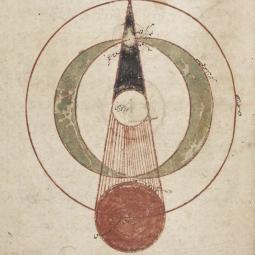
Room 142
Razieh S. Mousavi studied mathematics and the history of science, earning her PhD in 2023 from the Humboldt Universität zu Berlin. Her doctoral research was supported by the Max Planck Institute for the History of Science in Berlin. Her dissertation focused on al-Farghānī’s Elements of Astronomy, a ninth-century Arabic astronomical treatise, in which she explores both its scientific and literary dimensions. Mousavi’s research primarily examines the practice and influence of pre-modern astral and mathematical knowledge beyond the domain of experts. As part of her interdisciplinary approach, she has also investigated seasonal knowledge and environmental history in Islamic societies, analyzing how scientific traditions and evolving temporal perceptions of weather phenomena shaped human interaction with the natural world and contributed to societal sustainability.
Mousavi’s broader research interests lie at the intersection of historical studies in science, literature, and sociocultural dynamics. She seeks to foster dialogue between these fields, particularly in the context of pre-modern Islamic intellectual traditions. Moreover, she is deeply engaged in exploring the relationship between religion and science within Islamic history.
She is currently preparing a book for publication based on her dissertation, titled “Al-Farghānī’s Elements of Astronomy: Meaning and Form at Play to Open New Doors to Knowledge.” In 2025, Mousavi is serving as a guest lecturer at the Humboldt Universität zu Berlin. At the MPIWG, she is a member of the “Heavens in your Hand” Working Group and was previously a visiting fellow in the Max Planck Research Group "Experience in the Premodern Sciences of Soul & Body ca. 800–1650."
Current Projects
Completed Projects
Selected Publications
Mousavi, Razieh-Sadat (2025). “Agriculture and Water Practices in Islamic Societies: Interdisciplinary Perspectives from the History of Science and Environmental History.” In Geoanthropology and Waterscapes, ed. A. Bardi, P. D. Omodeo, and J…
Read More
Mousavi, Razieh-Sadat (2024). “From Complex to Simple: The Example of Qibla-Indicators.” In Failed Historical Scientific Instruments, ed. S. J. Schechner and S. Talas, 148–166. Leiden: Brill. https://doi.org/10.1163/9789004689107_010.
Read More
Mousavi, Razieh-Sadat and Hamid Bohloul (2024). “Manifestation in the One: Singularity of Knowledge in Mīrzā Ibrāhīm’s Numerical Riddle (Lughaz-i marqūm).” Manuscript Cultures 22: 155–168. https://www.csmc.uni-hamburg.de/publications/mc/mc22.html.
Read More
Mousavi, Razieh-Sadat and Petra G. Schmidl (2023). “al-Ashraf ῾Umar’s Tabṣira, Chapter xxiii: Timekeeping at Night by the Moon in 13th-Century Yemen and Beyond.” Suhayl 20: 7–42. https://raco.cat/index.php/Suhayl/article/view/422305.
Read More
Presentations, Talks, & Teaching Activities
26th International Congress of History of Science and Technology (Symposium: The Greek and medieval Ptolemy organized by Benno van Dalen and Nathan Sidoli)
Prague (virtually)
XXXIX Scientific Instrument Symposium (Panel: Failed Scientific Instruments)
London (virtually)


